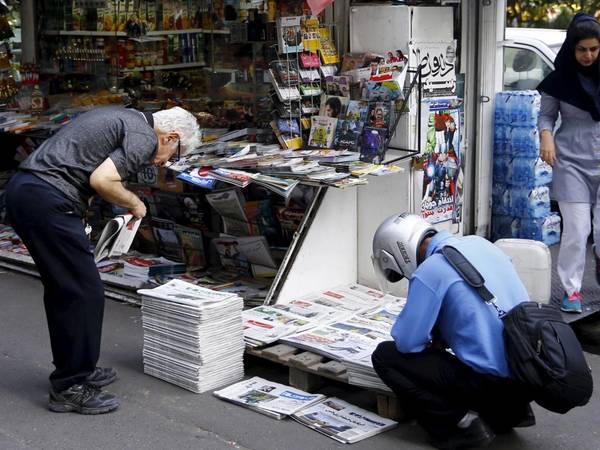A hardline newspaper in Iran has warned of potential protests and unrest across the country amid a confluence of political tensions over US talks and devaluation of the national currency, criticizing the administration’s handling of the crises.
Javan newspaper, affiliated with the Islamic Revolutionary Guard Corps (IRGC), cited an unnamed advisor to former president Hassan Rouhani as saying on Sunday that "If the president does not bring the negotiations to fruition, he should give up and leave the presidential office before the winter snow falls in Tehran."
The article by Javan said that such a sentiment about the administration of President Masoud Pezeshkian resonates with both supporters and critics of the government.
"This idea is gaining traction not only among government loyalists but also among its opponents," Javan said, noting that some newly emerged “suspicious” political factions, particularly those that surfaced after the recent elections, appear to be maneuvering to render Pezeshkian ineffective—blocking negotiations and steering him toward a scenario where he either resigns voluntarily or faces a turbulent path toward impeachment in parliament.
"This push for the president's removal is like the two blades of a scissor, cutting deeper into the political landscape and driving the country toward a major crisis before the year’s end."
Javan claimed that, according to enemy intelligence services, growing public discontent fueled by government inefficiency, rising poverty, and inequality could trigger protests in Iran, potentially leading to unrest similar to the events of November 2019.
In 2019, a wave of nationwide protests in Iran, known as Bloody November, erupted following a fuel price hike. What began as economic grievances quickly escalated into demands for the overthrow of the government and Supreme Leader Ali Khamenei. According to various sources, security forces killed at least 1,500 protesters between November 15 and 17.
The Pezeshkian administration is caught between opposing pressures. While urged to ease US sanctions, it faces a firm ban on talks with Washington imposed by the Supreme Leader on Friday.
Since Khamenei’s rejection, Iran’s currency, the rial, has been in freefall, hitting a record low of 915,000 per US dollar on Sunday.
“Negotiating with such a government should not be done; it is neither wise, intelligent nor honorable,” said the 85-year-old cleric during a meeting with air force personnel in Tehran.“No problem will be solved through negotiations with the United States,” he added.
Also on Sunday, Gholam-Ali Haddad-Adel, a member of the Expediency Discernment Council and a close aide to Khamenei, said, “Those who support negotiations with Trump should clarify what they are willing to offer in a deal to persuade him to lift the sanctions.”
He added, “Mr. Khamenei presents arguments for his stance; those in favor of negotiating with Trump should also provide their reasoning.”
Sociologist Taghi Azad Armaki, in an interview with Etemad newspaper, also warned of potential protests, citing "high prices, the rising dollar rate, high rents, health problems, emigration, and absolute poverty" as key pressures on the population.
"These issues remain unresolved," he warned, "and if not addressed, will soon manifest as widespread protests." He criticized “extremist groups” opposed to negotiations for undermining the administration, stating that they must be controlled and act in the interests of the ruling establishment.
Referring to hardliners, Armaki added, "If extremism is not curbed in the current situation, it will continue to take the form of a widespread wave and will harm the entire system. Social crises should not be allowed to turn into security crises."
Prominent commentator Ahmad Zeidabadi also criticized Friday prayer leaders, accusing them of delivering contradictory and confusing messages.
During Friday prayers, chants opposing negotiations with the US and their supporters—including Vice President for Strategic Affairs Javad Zarif—echoed as Khamenei's representatives, the Friday prayer imams, denounced the idea.
Zeidabadi also condemned the attempts of hardliners who say there is no need for talks with the US because it would not solve Iran's financial crisis. "They routinely blame America for all of the country's cultural, social, and political problems," Zeidabadi wrote, "even though the US neither claims nor has the ability to create them. Yet, when it comes to economic issues, they attribute nearly all problems to internal mismanagement while dismissing the impact of America's extensive sanctions. The contradictions have become deafening."
